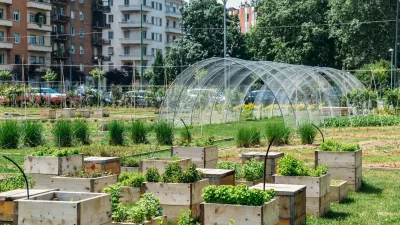It may be one of the worst food deserts in the country, but Detroit has enough open land in the city's 103,000 vacant lots to become self-sufficient in terms of food production, argues Mark Dowie.
Some 80 percent of Detroit residents are presently purchasing their groceries at convenience stores and gas stations. That could soon change; the city's plan to demolish thousands of homes and concentrate the population in viable neighborhoods will leave vast open areas suitable for cultivation. Mark Dowie, author of Losing Ground: American Environmentalism at the Close of the Twentieth Century, suggests that Detroit could actually become a highly sustainable city if this asset were used.
"Were I an aspiring farmer in search of fertile land to buy and plow, I would seriously consider moving to Detroit. There is open land, fertile soil, ample water, willing labor, and a desperate demand for decent food. And there is plenty of community will behind the idea of turning the capital of American industry into an agrarian paradise. In fact, of all the cities in the world, Detroit may be best positioned to become the world's first one hundred percent food self-sufficient city.
An American Institute of Architects panel concludes that all Detroit's residents could fit comfortably in fifty square miles of land. Much of the remaining ninety square miles could be farmed. Were that to happen, and a substantial investment was made in greenhouses, vertical farms, and aquaponic systems, Detroit could be producing protein and fibre 365 days a year and soon become the first and only city in the world to produce close to 100 percent of its food supply within its city limits."
FULL STORY: Food Among the Ruins: Should Detroit Be Converted Into a Farming Mecca?

Alabama: Trump Terminates Settlements for Black Communities Harmed By Raw Sewage
Trump deemed the landmark civil rights agreement “illegal DEI and environmental justice policy.”

Planetizen Federal Action Tracker
A weekly monitor of how Trump’s orders and actions are impacting planners and planning in America.

The 120 Year Old Tiny Home Villages That Sheltered San Francisco’s Earthquake Refugees
More than a century ago, San Francisco mobilized to house thousands of residents displaced by the 1906 earthquake. Could their strategy offer a model for the present?

Opinion: California’s SB 79 Would Improve Housing Affordability and Transit Access
A proposed bill would legalize transit-oriented development statewide.

Record Temperatures Prompt Push for Environmental Justice Bills
Nevada legislators are proposing laws that would mandate heat mitigation measures to protect residents from the impacts of extreme heat.

Downtown Pittsburgh Set to Gain 1,300 New Housing Units
Pittsburgh’s office buildings, many of which date back to the early 20th century, are prime candidates for conversion to housing.
Urban Design for Planners 1: Software Tools
This six-course series explores essential urban design concepts using open source software and equips planners with the tools they need to participate fully in the urban design process.
Planning for Universal Design
Learn the tools for implementing Universal Design in planning regulations.
Clanton & Associates, Inc.
Jessamine County Fiscal Court
Institute for Housing and Urban Development Studies (IHS)
City of Grandview
Harvard GSD Executive Education
Toledo-Lucas County Plan Commissions
Salt Lake City
NYU Wagner Graduate School of Public Service





























